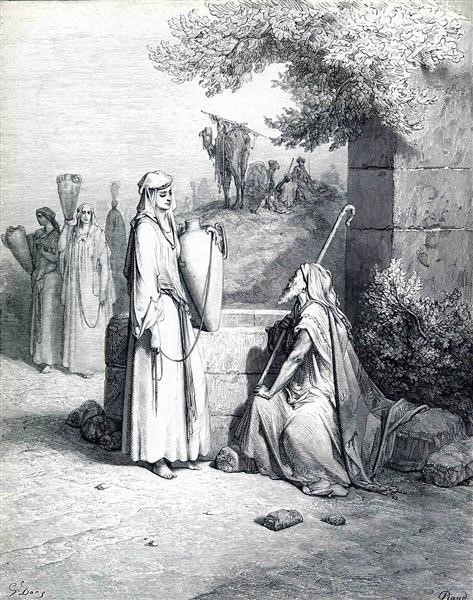Genesis 24
Abraham was old, and his wife, Sarah, had just died at the age of 127. He began to feel a sense of urgency to get his son, Isaac, married off before he himself kicked the bucket. Isaac was past the prime age for marriage already. He was 40 years old, and most people in that time period were married before the age of 30. Abraham had his chief servant swear to the Lord that he would find a good woman for Isaac to marry. He gave his servant three very specific stipulations:
- The woman must not be a Canaanite. (v 3)
The Canaanites were behaving badly and were likely to not be believers.
- The woman must be from Abraham’s home country (Ur of the Chaldeans in the region later called Babylon) and must be a relative of Abraham. (v 4)
This would ensure that the woman that Isaac married would be a believer. Isaac was the heir of God’s covenant promises (see Genesis chapters 12, 15, and 17), so it was important that he wasn’t associating with ungodly groups.
- Isaac must never return to Ur of the Chaldeans. (v 6)
If Isaac were to return back to Abraham’s homeland, Ur, he would forsake the land that was given to Abraham through the covenant, the Promise Land.
The servant asked “well, what if the woman doesn’t want to follow me back, then what?” Abraham responded confidently, “this is God’s will. The Lord will send the angel before you and that is where you should find the wife for Isaac. If the woman is unwilling to follow you, then you are free from the oath, but whatever you do, do not let Isaac return back to Canaan.” (v. 7)
The servant grabbed 10 of his master’s camels and went on his way to Aram-naharaim, the town of Abraham’s brother, Nahor. He knelt the camels down by a spring well and asked God, “let the woman who offers me and my camels water be the one that you have appointed for Isaac. This is how I will know she is the one.”
Before he had even finished praying, he saw a beautiful young maiden walking down to the spring carrying a jug on her shoulder. Her name was Rebekah. He ran up to her and asked for a drink from her jug, and she lowered her jug and let the servant have a drink. Then she offered to give the camels all the water that they desired. The servant watched her to make sure that his journey was a success. He adorned the woman with a gold nose ring and two golden bracelets to wear. He asked her who her parents were and if she had room for him and his 10 camels to spend the night. She mentioned that she was the son of Nahor, Abraham’s brother. The servant knew she was the one.
That night at her house, the servant wouldn’t eat until he told Rebekah’s family the story. Then he told them that Rebekah must leave to join her new family first thing in the morning. Rebekah’s brother, Laban, requested 10 more days, but Rebekah knew that this was the fulfillment of a prophecy, and she shouldn’t keep the Lord waiting. The next day she and her female servants mounted the camels and followed the man. Isaac was in a field heading home to the Negev region when he saw the camels off in the distance. Rebekah asked who the man in the field was. The servant answered, “It is my master”. She took her veil and covered her face. She got off her camel to greet Isaac, and he took her into the tent of his mother, Sarah, and took Rebekah to be his wife.
So what just happened..?
The servant of Abraham was the chief servant; he was in charge of everything Abraham had. He was trusted. The devotion that the chief servant had to his master and his master’s God is why Abraham had picked him. Abraham knew that his servant was obedient and would pay attention to the instructions that Abraham had given him. He could have looked for a beautiful woman for Isaac that had a lot of money, but he didn’t. He looked for character. Was she willing to serve, because “whoever wants to become great among you must be your servant, and whoever wants to be first must be slave of all” (Mark 10:43)? He humbly asked for a plan to test this woman’s character. The test begged to see Rebekah’s kindness, hospitality, and her willingness to help a stranger. It also showed that she had a strong work ethic.
The servant hadn’t even finished praying before the Lord provided for him. I think it is probably because the Lord’s will and the mission set out for the servant by Abraham were aligned. She did exactly what answered the signs that the servant asked for. She gave the servant and the camels all the water that they needed. Did you know one camel can drink 53 gallons of water? That’s roughly 530 gallons of water that those 10 camels drank. How many trips to the spring did she have to make? The servant identified Rebekah out of a crowd of women. It was meant to be, and God was eager.
Psalm 1:3 says blessed is the one “who meditates on His law day and night. That person is like a tree planted by streams of water, which yields its fruit in season whose leaf does not wither – whatever they do prospers.” Abraham’s servant prayed and trusted in the Lord. He was planted exactly where he needed to be to find exactly the right woman to fulfill the promise.
The servant refused to eat dinner that night until he had told the story of what he had been tasked with. He felt that this mission was more important than his own comfort.
He asked Rebekah to go marry Isaac and she, without hesitation, said, “I will go”, knowing she may very well never see her family again. She saw God’s sovereign hand in it and didn’t want to keep him waiting, for fear she may miss the opportunity. At that time, and still often today, women married off for the security that having a husband provided. He loved her and was comforted after his mother’s death. They, together, carried on the line that led to the birth of Jesus the Messiah.
Romans 9:9-23 says that the promise was to be fulfilled through a diverse list of people that included Sarah, Rebekah, and Isaac because it was destined by God, it was His choice. It may seem like it was completely up to Abraham’s chief servant, but it was God’s hand guiding him to Rebekah. God does things like take women at wells and use them to bring the world a God-in-the-flesh-savior because it pleases him to raise up the humble things of the world to shame the proud (1 Samuel 2:1-10).

